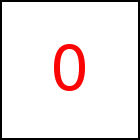dV Library Method
Short Description: Set Depth Vector of Object
Signature: t.dV (x,y,z) or (p)
Group: Shape
Class: transition Class
Defines the depth vector of the animated object. Default is (0,0,0).
For amimating 2D objects the depth vector is (almost) irrelevant, because 2D objects
do not have a depth. More precisely for taccgl™ a 2D object is just the front face
of a 3D box whereby all the other faces of the 3D box are invisible.
Sample HTML
element with id="s10"
The depth vector gives the displacement from the top left front corner to
the top left back corner. Alternatively (p) can be specified as a Position Specification
that will be resolved into coordinates. p then specifies to top left back corner
and the width vector is evaluated by subtracting the current top left front corner
from p.
For 2D transitions just rotateMiddle takes the depth into
account when calculating the middle to rotate around.
Examples
taccgl.actor("s10").rotateMiddle(1,0,0).start(); | RUN |
taccgl.actor("s10").dV(0,0,500).rotateMiddle(1,0,0).start(); | RUN |
The following examples display a 3D box.
By enlarging or reducing the vector, the depth of the animated object
can be changed.
Examples
var a=taccgl.actor("s10",taccgl.dddBox) .start(); | RUN |
var a=taccgl.actor("s10",taccgl.dddBox).dV(0,0,500).start(); | RUN |
var a=taccgl.actor("s10",taccgl.dddBox).dV(200,0,500).start(); | RUN |
var a=taccgl.actor("s10",taccgl.dddBox).dV(0,0,500).rotateMiddle(1,0,0).start(); | RUN |
var a=taccgl.actor("s10",taccgl.dddBox).dV(0,0,50).rotateMiddle(1,0,0).start(); | RUN |
WebGL™ is a trademark of the Khronos Group Inc.
| 






